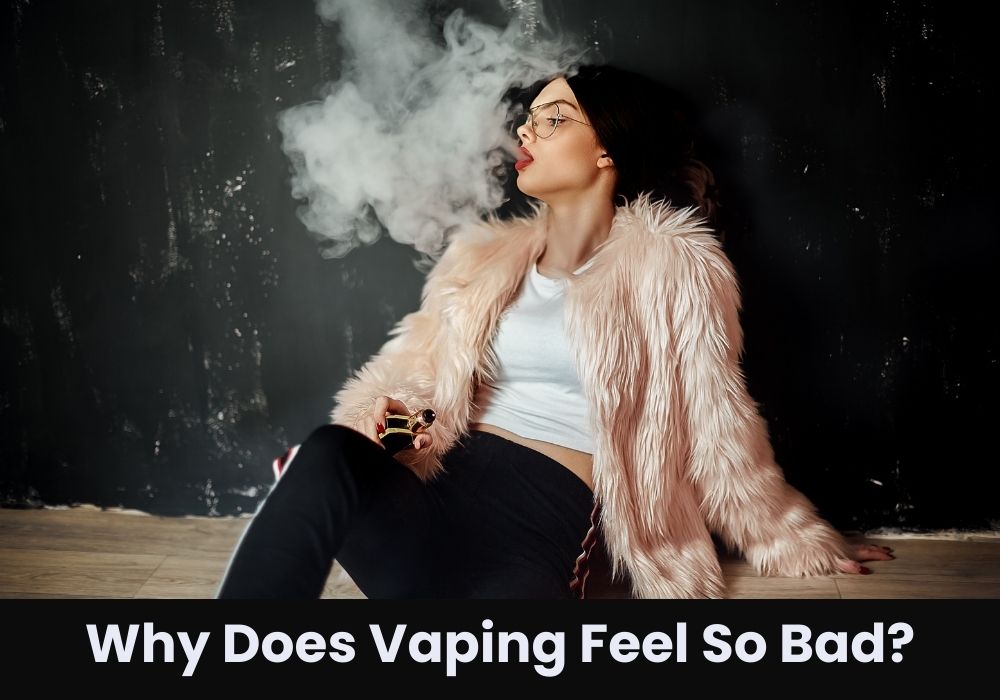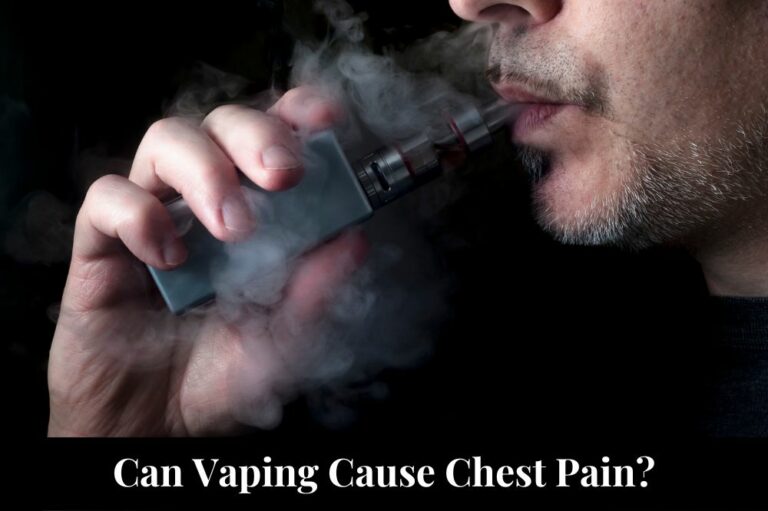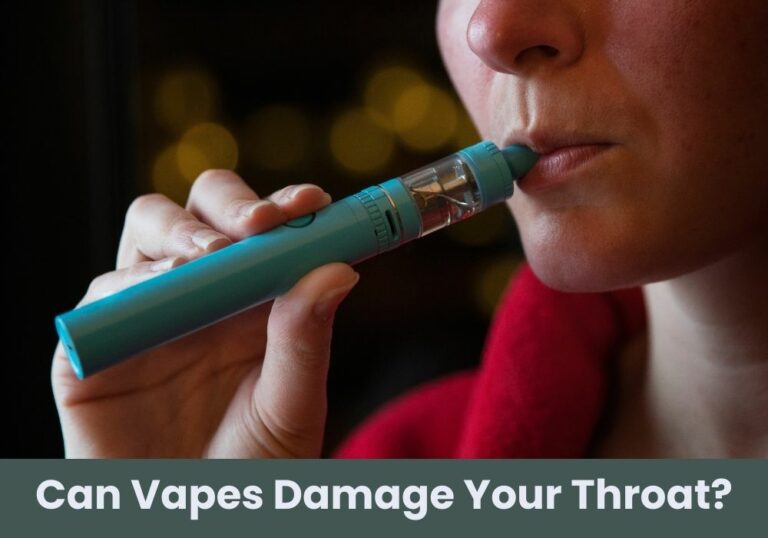
If you’ve ever tried vaping, you might have experienced a strange and unpleasant sensation in your throat. This feeling is often described as a burning or scratching sensation, and it can be quite uncomfortable. So, why does vaping feel so bad?
One reason for this sensation is the high concentration of nicotine in e-cigarettes. Nicotine is a highly addictive substance that can cause a range of physical and psychological effects, including increased heart rate, raised blood pressure, and feelings of anxiety. When you inhale the vapor from an e-cigarette, you’re taking in a concentrated dose of nicotine, which can irritate your throat and cause that unpleasant sensation.
Another factor that can contribute to the unpleasant feeling of vaping is the chemicals that are used to create the flavorings and other additives in e-cigarettes. Some of these chemicals can be irritating to the throat and lungs, and may even be toxic when heated and inhaled. Additionally, the propylene glycol and vegetable glycerin that are used to create the vapor can also cause irritation and inflammation in the throat and lungs.
Understanding Vaping
Vaping, also known as e-cigarette use, is a relatively new phenomenon that has gained popularity in recent years. It is a method of inhaling vapor produced by heating a liquid, which usually contains nicotine, flavorings, and other chemicals. Although vaping is often marketed as a safer alternative to smoking, it has been linked to a number of health problems that are still being studied.
When you inhale the vapor produced by vaping, you are exposing your lungs to a variety of chemicals that may be harmful. According to Johns Hopkins Medicine, research suggests that vaping is bad for your heart and lungs, and that nicotine is a toxic substance that is highly addictive. It causes you to crave a smoke and suffer withdrawal symptoms if you ignore the craving.
One of the most serious health problems associated with vaping is a condition called EVALI, or e-cigarette, or vaping, product use-associated lung injury. EVALI causes widespread damage to your lungs and gives you symptoms like coughing, shortness of breath, and chest pain, and it can be fatal. Nicotine is highly addictive and can make it even more challenging to quit.
Another issue with vaping is the chemicals that are added to the liquid used in e-cigarettes. Flavorants and other ingredients can be harmful when inhaled. Plus, other chemicals can be produced during the vaporizing process. According to NIH News in Health, vaping exposes the lungs to a variety of chemicals, including the main active chemicals in tobacco (nicotine) or marijuana (THC).
SPIRITBAR Katana BP10000
- Slender, leather-textured body reminiscent of a katana handle for an authentic samurai feel
- Unique samurai-inspired e-liquid flavor - fruity yet not too sweet, with a luxurious, elegant aroma
- Powerful 650mAh rechargeable battery for extended vaping time
- Large 18ml e-liquid capacity and 10,000 puff capacity
- Advanced mesh coil and e-liquid & power display screens for optimal vaping experience
The special juice captures the essence of the samurai spirit with its rich, smoothly pulsating flavor that brings new satisfaction with every puff. The device's slender, leather-textured design evokes the grip of a samurai's katana, making this product a perfect choice for beginner vapors.
In summary, vaping is a method of inhaling vapor produced by heating a liquid, which usually contains nicotine, flavorings, and other chemicals. Although it is marketed as a safer alternative to smoking, it has been linked to a number of health problems, including EVALI, which can be fatal. Nicotine is highly addictive, and the chemicals added to the liquid used in e-cigarettes can be harmful when inhaled.
Physical Effects of Vaping
If you’re wondering why vaping feels so bad, it’s important to understand the physical effects it can have on your body. Here are some common physical effects of vaping:
Respiratory Issues
One of the most common physical effects of vaping is respiratory issues. Vaping can cause irritation and inflammation in your lungs, leading to coughing, wheezing, and shortness of breath. In some cases, vaping can even cause more serious respiratory problems like bronchitis and pneumonia.
Cardiovascular Problems
Vaping can also have negative effects on your cardiovascular system. Nicotine, a key ingredient in many e-cigarettes, can cause your blood vessels to narrow, making it harder for your heart to pump blood throughout your body. This can lead to high blood pressure, heart disease, and an increased risk of stroke.
SPIRITBAR Jack’s Flask 9000 Puffs
- Stylish pirate flask-shaped body providing an exciting vaping experience
- Delivering up to 9000 puffs per device
- 20ml e-liquid capacity with 50mg nicotine strength for satisfying throat hit
- Specialized pirate-themed e-juice flavors for rich, swirling taste
- Premium mesh coil optimizes flavor profile for maximum vaping enjoyment
This disposable vape captures the daring spirit of the high seas with its flask styling and signature pirate e-juice flavors. The extraordinary battery life provides 9000 indulgent puffs for extended vaping pleasure. Live boldly and freely with the Jack's Flask - a legendary vaping experience fit for a pirate's adventures.
It’s important to remember that these are just a few of the physical effects of vaping. If you’re experiencing any negative symptoms after vaping, it’s important to talk to your doctor to get a proper diagnosis and treatment plan.
Psychological Impact of Vaping
Vaping not only has physical effects on your body, but it also has psychological effects. Here are some of the ways vaping can impact your mental health:
Addiction
E-cigarettes contain nicotine, which is highly addictive. Nicotine stimulates the release of dopamine in your brain, which is a neurotransmitter associated with pleasure and reward. This can lead to addiction, making it difficult to quit vaping.
Impulse Control
Vaping with or without nicotine has been shown to impact impulse control, especially in young adults whose brains have not fully developed yet. This can lead to poor decision-making, risky behavior, and addiction to other substances.
Mental Health
According to a 2019 JAMA study, frequent vaping is tied to higher odds of having a diagnosis of depression compared to never users. The study also showed current e-cigarette users had higher odds of reporting anxiety and other mental health issues.
Other Risks
Vaping has also been linked to mood disorders and permanent damage to parts of the brain responsible for memory, emotion, and critical thinking. It can also increase the risk of other addictions, such as alcohol or drug addiction.
It’s important to be aware of the psychological impact of vaping and to seek help if you are struggling with addiction or mental health issues. Talk to your doctor or a mental health professional if you are experiencing any negative effects from vaping.
Addiction and Dependency
Vaping can be highly addictive due to the presence of nicotine in most e-cigarette products. Nicotine is a highly addictive substance that can lead to dependency, making it difficult to quit vaping once you start.
When you inhale nicotine through vaping, it enters your bloodstream and reaches your brain within seconds. Once it reaches your brain, nicotine binds to receptors and triggers the release of dopamine, a neurotransmitter associated with pleasure and reward. This feeling of pleasure and reward is what makes nicotine so addictive.
According to the Mayo Clinic, nicotine dependence occurs when you experience unpleasant mental and physical changes when you try to quit vaping. These changes can include irritability, anxiety, depression, difficulty concentrating, and cravings for nicotine.
Additionally, vaping can lead to physical dependence, which means that your body becomes accustomed to the presence of nicotine and requires it to function normally. Over time, you may need to vape more frequently or use higher concentrations of nicotine to achieve the same effects.
SPIRITBAR Katana BP10000
- Slender, leather-textured body reminiscent of a katana handle for an authentic samurai feel
- Unique samurai-inspired e-liquid flavor - fruity yet not too sweet, with a luxurious, elegant aroma
- Powerful 650mAh rechargeable battery for extended vaping time
- Large 18ml e-liquid capacity and 10,000 puff capacity
- Advanced mesh coil and e-liquid & power display screens for optimal vaping experience
The special juice captures the essence of the samurai spirit with its rich, smoothly pulsating flavor that brings new satisfaction with every puff. The device's slender, leather-textured design evokes the grip of a samurai's katana, making this product a perfect choice for beginner vapors.
It’s important to note that addiction and dependency can occur even if you don’t start vaping with the intention of becoming addicted. Nicotine is a highly addictive substance, and it can be difficult to quit once you start using it regularly. If you’re struggling with nicotine addiction or dependency, there are resources available to help you quit, such as nicotine replacement therapy, counseling, and support groups.
Vaping and Oral Health
When you vape, the vapor that you inhale can have negative effects on your oral health. According to NewMouth, vaping can cause dry mouth, which can lead to bad breath, tooth decay, and gum disease. Dry mouth occurs when there is not enough saliva in your mouth to keep it moist. Saliva plays an important role in neutralizing acids produced by bacteria, which can erode your teeth and cause cavities.
Additionally, vaping can cause inflammation and irritation of the gums, leading to gum disease. The flavorings in e-cigarettes can also cause damage to your teeth and gums. Some flavors contain high levels of sugar, which can feed the bacteria in your mouth and lead to tooth decay. Other flavors contain acids that can erode your tooth enamel.
According to Dentaly, e-cigarettes can also cause staining on your teeth. The nicotine in e-cigarettes can cause your teeth to become yellow or brown over time. Stains can also be caused by the other chemicals in e-cigarettes, such as propylene glycol and glycerin.
To prevent oral health damage from vaping, it is important to practice good oral hygiene. Brush your teeth twice a day with fluoride toothpaste, floss daily, and visit your dentist regularly. You can also try using a mouthwash to help combat dry mouth and keep your mouth moist. If you are concerned about the effects of vaping on your oral health, talk to your dentist. They can help you develop a plan to protect your teeth and gums while still enjoying vaping.
The Role of Nicotine
When it comes to vaping, nicotine is the main ingredient that causes the “buzz” or “head rush” that many users report feeling. Nicotine is a highly addictive substance that is found in tobacco and is also used in many e-cigarette liquids. When you inhale nicotine, it quickly enters your bloodstream and reaches your brain within seconds, leading to a release of dopamine, a feel-good chemical in your brain. This is what creates the pleasurable sensation that many people associate with smoking or vaping.
However, the effects of nicotine are not all positive. Nicotine is a stimulant that can increase your heart rate and blood pressure, leading to feelings of anxiety or nervousness. It can also cause your blood vessels to constrict, reducing blood flow to your extremities and making you feel cold or numb. In addition, nicotine can be harmful to your developing brain if you are a teenager or young adult, as it can interfere with brain development and lead to long-term cognitive and behavioral problems.
It’s important to note that while nicotine is the main ingredient in e-cigarettes and vaping liquids, it’s not the only harmful chemical that you may be inhaling. E-cigarettes can also contain other chemicals and toxins, such as formaldehyde, acetaldehyde, and acrolein, which can be harmful to your health. While vaping may be less harmful than smoking traditional cigarettes, it’s still not a safe alternative. If you’re looking to quit smoking or vaping, there are many resources available to help you, such as nicotine replacement therapy, counseling, and support groups.
Comparing Vaping and Traditional Smoking
If you are wondering why vaping feels so bad, you may want to compare it to traditional smoking. While vaping and smoking both involve inhaling nicotine, they differ in several ways.
Nicotine Content
One of the most significant differences between vaping and smoking is the amount of nicotine content. Traditional cigarettes contain a high amount of nicotine, which can lead to addiction and other health problems. On the other hand, e-cigarettes and vaping devices come in various nicotine levels, and you can choose the concentration that suits your needs.
Chemicals
Traditional cigarettes contain more than 7,000 chemicals, many of which are toxic and can lead to cancer, heart disease, and other health issues. In contrast, e-cigarettes contain fewer chemicals, but they still contain nicotine, which can be harmful to your health.
Delivery System
Smoking delivers nicotine to your lungs by burning tobacco, and the smoke is then inhaled. Vaping, on the other hand, uses a battery-operated heater to warm an e-liquid or “e-juice,” creating a vapor that is consumed. Vaping is considered less harmful than smoking because it does not produce smoke, which contains many harmful chemicals.
Risks
While vaping may be less harmful than smoking, it still poses risks. Vaping can cause lung damage, respiratory problems, and other health issues. Additionally, e-cigarettes can contain a large dose of nicotine, which can slow the development of brains in fetuses, children, and adolescents.
Overall, while vaping may be less harmful than traditional smoking, it is still not entirely safe. If you are trying to quit smoking, it is best to seek professional help and explore other nicotine replacement therapies.
The Impact of Vaping on Youth
Vaping has become increasingly popular among young people in recent years, but it is not without its risks. Here are some of the ways that vaping can impact youth:
Nicotine Addiction
Many e-cigarettes contain nicotine, which is highly addictive and can harm adolescent brain development, which continues into the early to mid-20s. Nicotine can also lead to changes in the brain that make it more difficult to quit using e-cigarettes.
Health Risks
Vaping can have a negative impact on your health, including bad breath, ulcers, soreness in some areas and a dry mouth. This could lead to a lack of saliva and, potentially, tooth decay.
False Reward
Vaping can also be a false reward for young people. When adolescents start choosing the false reward of nicotine over true rewards like getting good grades, doing well at sports, or spending time with friends and family, it can have a negative impact on their overall well-being.
Gateway to Other Substances
Vaping can also be a gateway to other substances, including traditional cigarettes and marijuana. Young people who vape are more likely to try other substances, which can lead to a lifetime of addiction and health problems.
It’s important for young people to understand the risks associated with vaping and to make informed decisions about their health. If you or someone you know is struggling with nicotine addiction or other substance abuse issues, there are resources available to help.
Regulations and Restrictions on Vaping
If you are a vaper, you may have noticed that there are regulations and restrictions on vaping in many places. These regulations and restrictions are in place to protect public health and safety. Here are some of the most common regulations and restrictions on vaping:
- Age Restrictions: Many countries have laws that prohibit the sale of vaping products to minors. In the United States, the legal age to purchase vaping products is 21 years old. It is important to follow these laws to prevent underage vaping and nicotine addiction.
- Public Use Restrictions: Many states and countries have laws that prohibit vaping in public places, such as restaurants, bars, and parks. This is because secondhand vapor can be harmful to others, just like secondhand smoke from cigarettes.
- Product Regulations: In many countries, vaping products are regulated by the government. For example, in the United States, the Food and Drug Administration (FDA) regulates e-cigarettes and other vaping products. This includes requiring manufacturers to submit their products for FDA approval before they can be sold.
- Taxes: Some states and countries have implemented taxes on vaping products to discourage their use. These taxes can make vaping more expensive, which may encourage people to quit or not start vaping in the first place.
It is important to follow these regulations and restrictions to protect your health and the health of those around you. If you are unsure about the regulations in your area, you can check with your local government or health department.








